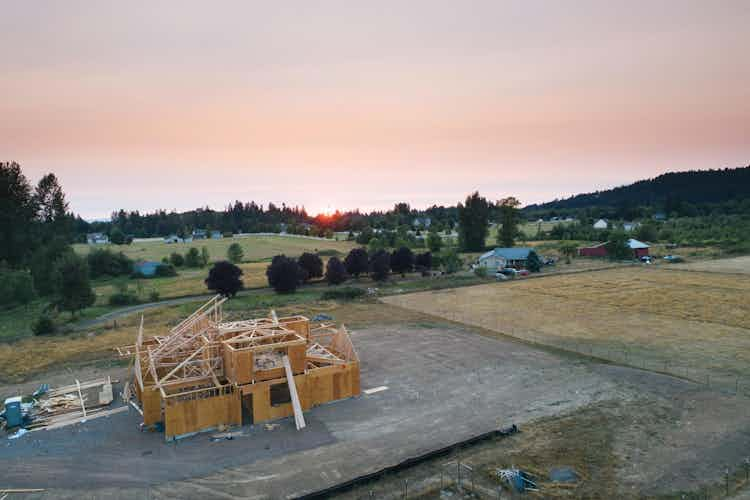New builds can take time to finish, but it's all worth it when you finally move in. Many factors, like the surrounding area, land, and site plan, can all determine the completion date of a new build home.
Buying a new build isn't for everyone, but moving up the property ladder in this way can be a big win in your 50s, whether you want more space for your teenage children or want to give your grandkids their own room.
Perks of moving into a new build home
Why should you consider a new build home? You may have heard of potential issues with new builds, such as building delays and snagging issues. But there are many benefits to considering this type of housing, especially if you're looking at a new build home in your 50s.
Brand new home
You can start decorating your new home right away as it's yours from the first day. The best part is that it comes with various bells and whistles and will comply with the latest energy efficiency standards.
Warranty Protection from risk
New build homes come with a warranty, typically ten years in total, offered by the National House Building Council (NHBC). Aside from covering pre-completion contractor insolvency, Buildmark provides a two-year repair warranty and a further eight years of cover for physical damage to the property caused by sub-standard work. The NHBC warranty is activated from the point of exchange of contracts and protects you from many issues you may face with a new build house.
No chain restrictions
With no onward chain, the move-in process is much more straightforward and stress-free. Buying a new build property means you avoid last-minute pull-outs and get to decide when you move in, rather than having to match schedules with the other party. As well as avoiding chain issues, you avoid any problems that might arise with the seller, such as them leaving the house a mess and making your move-in more difficult. The only potential problem you might face is if the developers hit a delay and you have a buyer waiting to move into your current home.
But having an expected ready date for your new build home can help you plan when you can put your current home up for sale. Knowing when you can start packing and vacate your existing home will give your buyer the time they need to organise their affairs, as they may be involved in a chain themselves.
What comes after reserving a new home
After reserving a plot with your estate agents for a reservation fee, you must secure a loan by consulting a mortgage advisor. Due to the different timeframes involved in buying new builds and buying and selling an existing property, it is best to prepare for this step in advance.
Buying off-plan is a simple process and easy to secure a mortgage for; the issue appears with the offer period. Most are often only valid for six months, meaning you will need to finish the process within that time frame. Your lender will request a mortgage valuation to determine the value of your new build before agreeing to lend.
You can apply for extensions in the mortgage if you believe your house won’t be completed in time, but this restarts the application process. Most lenders now offer special mortgages for new builds with extended validity periods. You should consider mortgage offers in light of the developers’ timescale.
Making a deposit
The amount you can secure through a new build mortgage may be less than an existing property. This is because lenders usually cap the amount they are willing to lend due to property devaluation risk. However, you can still generally get up to an 85% loan-to-value ratio, with you covering the remaining deposit. Keep this in mind when planning your finances. If you need a bigger loan-to-value mortgage for whatever reason, you can also look into help to buy loans or other schemes better suited to your circumstances.
Property developers will often offer incentives. With some research, you can find agents offering to waive legal fees or service charges to attract customers. These can, however, affect how lenders manage your mortgage. A good idea may be to hire a mortgage broker as they are often privy to deals not in the public domain.
Once a mortgage has been secured, the next step is to hire a conveyancer.
Why do you need a conveyancer?
There are many legal requirements and building codes that must be followed with a new build. A conveyancer is best equipped to take care of the legal aspect to ensure everything goes off without a hitch.
The conveyancer will protect your legal interests against any pressure from your lender or developers. However, before you exchange contracts, there are several things you should take care of:
- Secure the property through reservation fees
- Keep your finances in order.
- Make sure the application process has begun for a mortgage, and ideally, one has been secured already. This process can take time given the build, so plan ahead.
- Conduct a snagging survey to ensure there are no structural issues with your new build property.
- Hire a surveyor who will conduct a visual assessment of the work against legal standards. Every aspect of the property, including the interior and exterior, should be surveyed to avoid future problems.
- Once you have instructed your conveyancer to act on your behalf, they will request the contract pack and deal with all legal requirements relating to the property.
- Review all legal documents once they have been prepared before exchanging contracts.
The contract will also specify the long stop date, which indicates the date the agreement will automatically terminate if not fulfilled. Once the transfer of funds from your mortgage lender to your seller has taken place, the process is completed. You will be registered with the Land Registry within 30 days and need to pay any stamp duty liability. After that, there is the completion date, when you will finally be able to move into your new house. All parties agree on this date, but you will have more say as a new build home buyer.
What does a conveyancer do?
The conveyancer's primary responsibility is to take care of the legal aspect, which can be hard to keep up with. A conveyancer’s duties include:
- Checking property plans for exposed boundaries.
- Going over the paperwork involved and ironing out any issues.
- Studying the draft contract and determining if it is leasehold or freehold. You need to be informed of property leases on which you are building to keep up with lease renewals.
- Arranging and managing the exchange of contracts and transfer of funds.
Securing your new home
As mentioned, you'll need to pay reservation fees to "reserve" the property you're buying. Within the reservation period, usually 28 days, you must secure a loan for your purchase.
The agreement for reservations is set out by the Consumer Code for Home Builders, which specifies it should detail the exact purchase price plus all applicable additional charges.
The reservation fee is a safeguard in case the deal is not completed. It can range from upwards of £500, depending on the property's value. It is deducted from the final purchase cost but is non-refundable if the timescale for the exchange of contracts is not met or you go beyond the long stop date.
Learn more about the new build premium.
Things to consider before moving into a new build
Once your home is built and ready, it’s time to prepare for the move. Keep in mind that moving into a new build is not quite the same as an existing property, so you will want to get a home demonstration. This acts as a guided tour of your new home. The builder will take you around the house and demonstrate how the various facilities and appliances work. These can include:
- Using the front door security lock
- Location and use of the water supply valve
- Ventilation and heating systems
- Location of utility meters
- Location of stopcocks
- Using the alarm systems
A home demo can save you a lot of hassle as a new occupant. Another good idea is to take pictures during the home demo so you can refer to them later if you forget something. You can even record the entire demonstration to go back to as needed.
During the demo, test out appliances for yourself. Check if everything is working as it should, and note any problems so the developer can fix them as soon as possible. Obtain manuals for all the appliances installed in the house from the developer. This is your new home, so don't leave any stone unturned. Check switches, the stove, the tap, and all other aspects of the house to ensure it is in proper working order. You must also ensure the developers built the house according to the plans – you would be surprised what can be missing!
Note down any issues you see around the house or anything that is not the way you would like it. Then, communicate these issues directly to the builder so they can correct them in time for your move. It is best to do this by email, which ensures there is a dated copy of your request and any reply.
Move-in checklist
There are quite a few things that need to be taken care of (ideally before you move) to save yourself hassle later on. These include:
- Plan for your interior decoration. You can even bring a tape measure to your home demo, so you start ordering furnishings. It will also help to plan what goes where so you aren't left with clutter at the last moment.
- Set up connectivity. Internet, satellite TV, and other services can take a while to set up, so get started on these before moving in, unless you are prepared to spend a few weeks without them!
- Create a new address and postcode. Your builder should apply for these through the local council. Get this information to Royal Mail, so you can start receiving your correspondence at the new address.
- Order bins. These can often get overlooked until you have already moved in, causing delays. Your local council should be able to deliver these to your address once you contact them. It is also best to find out in advance about bin collection days as you may have lots of packaging and general rubbish when you first move in.
- Door number. Your builder may provide you with a door number for your new home. If not, order yours early so you can put them up as soon as you have full ownership. This is an important step, especially when it comes to deliveries and home visits.
Avoiding the paperwork
There is also a lot of paperwork to keep track of. Your conveyancer should request and have in their possession several documents before the completion date, including:
- Lease agreements, if applicable
- NHBC or other policy documents, your Buildmark warranty or Premier Guarantee
- Details of service charges and ground rent, and who they are to be paid to
- Appliance manuals and warranty cards for all your appliances
These steps should prepare you for the big day and allow you to enjoy yourself! Then, on the actual day, check once again to ensure everything is in order.
Making the most of your new build property
New build homes offer some decided advantages over buying an existing property. If you're over 50, they can be an excellent opportunity to create a home designed to your specific needs. The new build buying process may take up some considerable time, but there are many resources available that can help out in the process. Don't forget to plan for your move before the completion date, so things are ready for you as a new homeowner.








